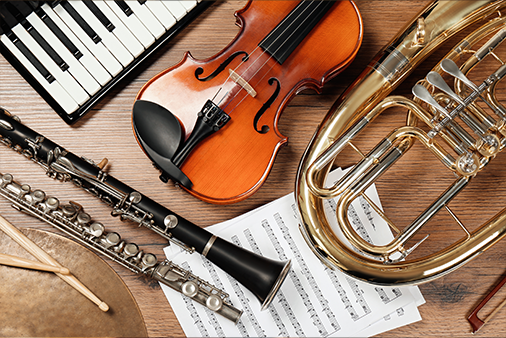Choosing the Right Musical Instrument for Your Child
Apr 07, 2023

Children benefit in many ways from learning to play a musical instrument. But which instrument is the right one for your child? The choices range from piccolo to piano, trumpet to tuba, and baritone saxophone to bass guitar. Children are unique, and the right choice for your child may not be the instrument their best friend plays. This is an important decision you don’t want to make more than once. Get it right the first time, so your child doesn’t ask to stop learning one instrument and start over with another.
If your kid shows interest in learning to play an instrument, it is important to spend time together exploring the vast variety of musical instruments, especially those played by middle school orchestras and high school bands. Most kids are unaware of the wide variety of instruments that bands, orchestras and individuals play. Learning about all the options can be a fun and educational opportunity for parents and children. Watch YouTube videos of orchestral performances such as John Williams' Film Night, or attend a local high school or college football game to watch the marching bands perform at halftime.
Factors to Consider in Choosing a Musical Instrument for Your Child
Some kids need an instrument that is small and easy to maneuver, some like the linear arrangement of a piano’s keys, and some may have an innate sense of rhythm that make drums and other percussion instruments the right choice.
Size and Age
Younger and smaller children need an instrument they can handle. Certain instruments such as violins and acoustic guitars are available in small versions. Others, such as trombones or string basses, don’t come in kid sizes and may be too cumbersome for a youngster. Children with smaller hands can learn piano. With their teacher’s guidance they can progress to musical pieces requiring a greater expansion of their fingers as they grow.
Take a Deep Breath
Is your kid the athletic type, perhaps a runner or a swimmer with good lung capacity? If so, the brass or woodwind section is the right place for them. Instruments in these categories range from the hefty tuba and baritone saxophone to the easy-to-carry clarinet and piccolo. You’ll also need to consider your child’s readiness to play an instrument with their mouth. If they are undergoing orthodontic treatment, or about to start wearing braces, you might want to avoid instruments that are pressed against the lips, such as the trumpet.
Availability of Teachers
Finding a teacher with expertise in your instrument is as important as choosing the instrument itself. Meyer Music has vetted music teachers that know how to work with beginners and advanced students. Check out some of our teachers’ videos here.
It’s Showtime. Is Your Kid Reserved or Assertive?
Some kids like to be center-stage. Others prefer to blend into the back row. Everyone gets butterflies before performing, but some young people are very uncomfortable with the idea of performing solo in front of an audience. Kids who love the limelight will be happy to play piano, guitar, violin or trumpet at a recital or concert. Quieter, more introverted children might be better suited to instruments that are usually part of an ensemble, such as woodwinds and percussion.
Choices, Choices
Just as with sports, dance and other extracurricular activities, the choice of a musical instrument for a child can be frustrating, as there is often no single right answer. Talk with the experts at Meyer Music about how to choose an instrument for your child.

